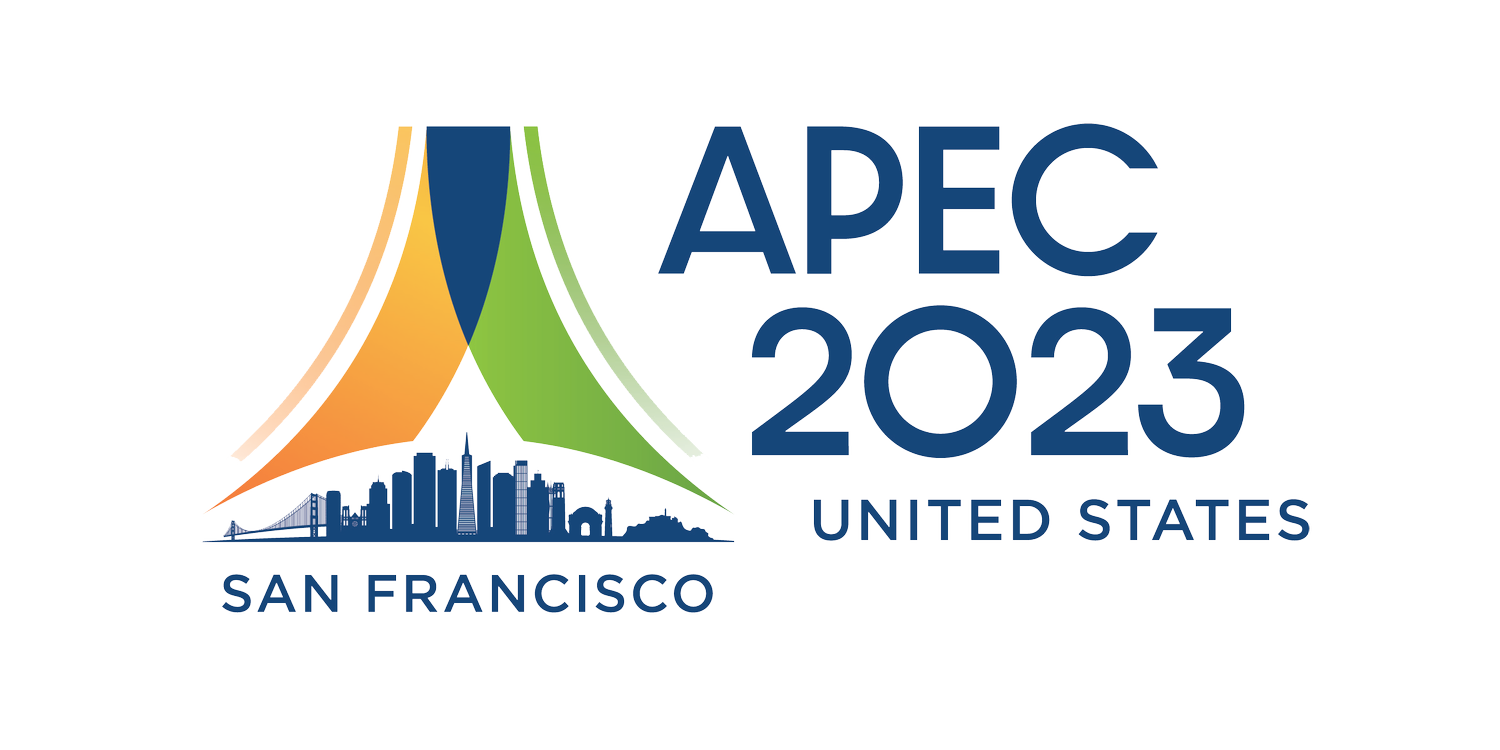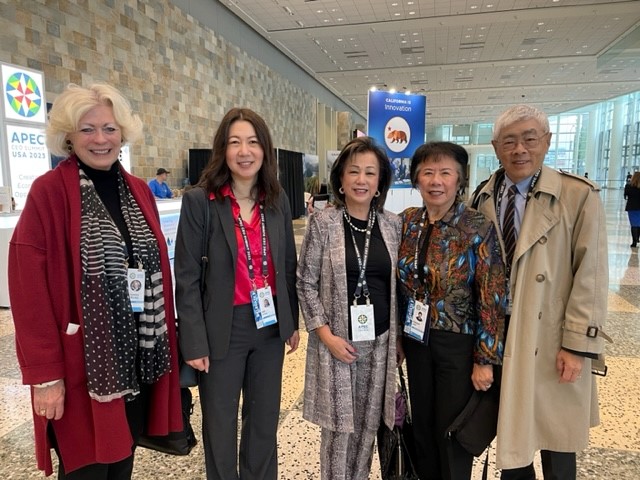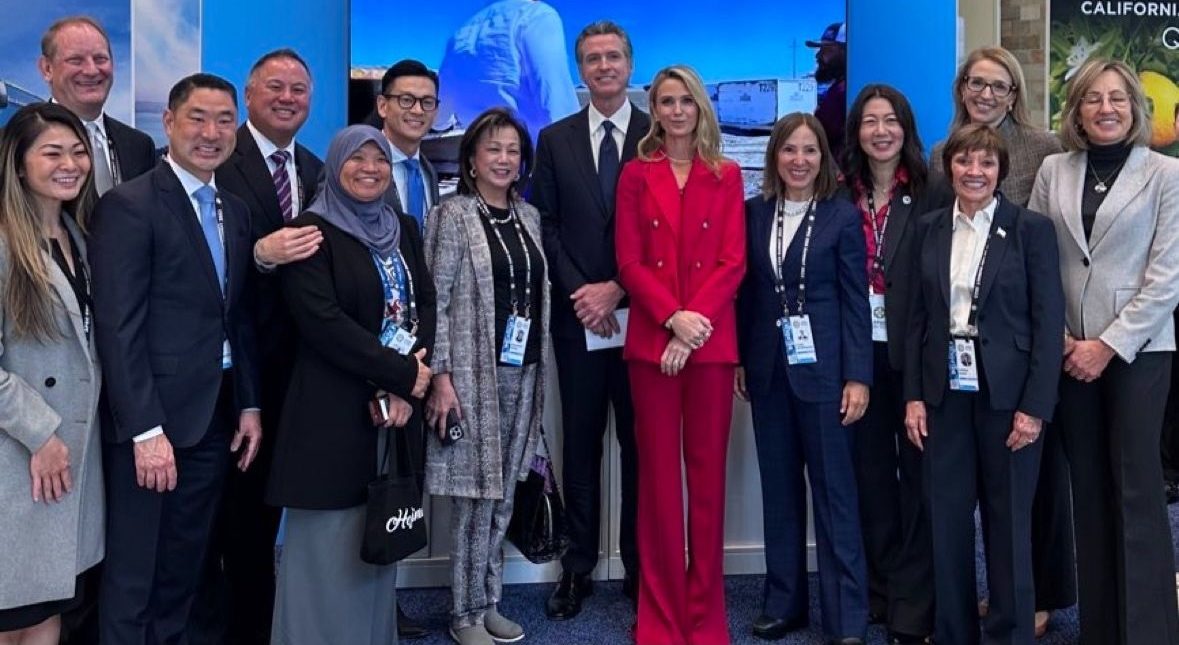
The California Chamber of Commerce was well-represented this week when Asia-Pacific business leaders gathered in San Francisco for their annual summit and related meetings.
The Asia-Pacific Economic Cooperation (APEC) CEO Summit took place from November 14–16, overlapping with the APEC Leaders’ Summit. The APEC 2023 theme was “Creating a Resilient and Sustainable Future for All.”
The CalChamber was represented at the three-day summit by Board members Travis Kiyota, senior vice president, head of global corporate affairs at East West Bank; Margaret Wong, president and CEO of McWong International Inc.; and Sima Patel, CEO of Ridgemont Hospitality, along with CalChamber President and CEO Jennifer Barrera, and Vice President of International Affairs Susanne T. Stirling.
Dominic Ng, of CalChamber-member company East West Bank, is chairing the APEC Business Advisory Council (ABAC). In this role, Ng and his counterparts are advising APEC leaders on issues affecting the continued economic growth of the APEC region.

CEO Summit
The CEO Summit is the most important gathering of Asia-Pacific business leaders each year. Its attendees include CEOs of multinational corporations and leading companies in the Indo-Pacific, as well as leading figures from media outlets in the region. Private sector speakers included CEOs of Visa, Mastercard, Pfizer, PwC, FedEx, ExxonMobil, and more.
A reception on Tuesday evening kicked off the CEO Summit. On the following two days, approximately 1,500 CEOs, thought leaders and other stakeholders, together with Asia-Pacific political leaders gathered for meetings and conversations.
The summit featured robust dialogue and engagement on global opportunities and challenges that are shaping economic, environmental and societal trends in the region, including sustainable energy transition, inclusive growth, resilient systems and societies, and the promise of innovation in building a better future world.
Wednesday, the first full day of the summit, included sessions on topics such as “APEC and the World: Global Dynamics, Regional Impacts,” “Leveraging Technology to Address Global Challenges,” and sustainability. The CEOs also heard remarks from various APEC leaders, as well as CEOs of global companies like Pfizer and Microsoft.
In an interview session, former U.S. Secretary of State Dr. Condoleezza Rice, director of the Hoover Institution, spoke about world conflicts and the need to re-introduce a sense of order.
The California booth at the summit, highlighting the state’s innovation, was staffed by the Governor’s Office of Business and Economic Development (GO-Biz) and featured small business.
The California booth was a gathering spot for business and government delegates, including Governor Gavin Newsom and Lieutenant Governor Eleni Kounalakis.
The Governor’s activities on Wednesday included a fireside chat on leading with vision, particularly on climate change issues.
Highlights of Thursday, the second day of the summit, included sessions on resilience, innovation, and artificial intelligence, and remarks by President Joe Biden. Biden noted that the United States is a Pacific power and Pacific nation currently focused on peace and security in the region together with economic growth while also working on green initiatives and protecting workers.
The closing ceremony on Thursday focused on Peru, the 2025 host for APEC meetings.
2023 Leaders’ Meeting
The CEO Summit took place alongside the Leaders’ Meeting, which attracted approximately 1,000 media representatives and nearly 20,000 delegates from across APEC’s member economies.
The APEC meeting was the largest convening of world leaders in San Francisco since the United Nations Charter was signed in 1945 during the UN Conference on International Organization.
U.S. President Joe Biden and China President Xi Jingping met on the sidelines of the APEC gathering Wednesday at a private estate south of San Francisco. The Associated Press reported that the presidents’ first face-to-face encounter in a year led to agreements to curb illicit fentanyl production and to reopen military ties.
U.S. Vice President Kamala Harris gave opening remarks at an APEC leaders welcome reception.
For more information about the APEC 2023 Leaders’ Week, visit www.APEC2023SF.org. News highlights appear at www.APEC.org.
APEC Facts
Formed in 1989, APEC serves as a multilateral forum in which Asian and Pacific economies can solve economic problems and cooperate in developing key economic sectors. The APEC economies are: Australia, Brunei Darussalam, Canada, Chile, People’s Republic of China, Hong Kong, Indonesia, Japan, Republic of Korea, Malaysia, Mexico, New Zealand, Papua New Guinea, Peru, Republic of the Philippines, Russia, Singapore, Chinese Taipei, Thailand, United States and Vietnam.
The 21 APEC economies represent approximately 60% of world gross domestic product (GDP), nearly 50% of world trade and 40% of the global population.
APEC commitments to promoting regional economic integration and trade, making trade and business easier across borders, supply chain connectivity, energy efficiency and renewables, and making sure growth is inclusive for everyone have seen great benefits for the region thus far as regional trade has increased multifold, with tariffs falling dramatically.
According to APEC, growth has soared in the region with real GDP and per capita income increasing, lifting millions out of poverty and creating a flourishing middle class.

California-APEC Trade
In 2022, California exported $129.89 billion to the APEC economies, 10.4% of the national total. Of total California exports to APEC, 22.8% ($29.66 billion) consisted of computers and electronics. Other top exports included non-electrical machinery, transportation equipment, processed foods and chemicals. California imported $406.13 billion from APEC in 2022, 30.8% of which was made up of computers and electronic products.
Other top imports included transportation equipment, electrical equipment, miscellaneous manufactured goods, and non-electrical machinery. In 2022, California was the top importing state from APEC and the second largest exporting state to the region.
CalChamber Position
The CalChamber, in keeping with longstanding policy, enthusiastically supports free trade worldwide, expansion of international trade and investment, fair and equitable market access for California products abroad and elimination of disincentives that impede the international competitiveness of California business. New multilateral, sectoral and regional trade agreements ensure that the United States may continue to gain access to world markets, resulting in an improved economy and additional employment of Americans.
The APEC is important as a vehicle for all Asia-Pacific economic integration. This regional group sets a high standard that will enhance the competitiveness of the economies that are part of it and help facilitate trade and promote investment among them, increasing their economic growth and development.

